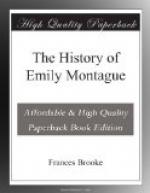The dryness of the air, the soft western breeze, the tremulous motion of the falling leaves, the rustling of those already fallen under our feet, their variety of lively colors, give a certain spirit and agreable fluctuation to the scene, which is unspeakably pleasing.
By the way, we people of warm imaginations have vast advantages over others; we scorn to be confined to present scenes, or to give attention to such trifling objects as times and seasons.
I already anticipate the spring; see the woodbines and wild roses bloom in my grove, and almost catch the gale of perfume.
Twelve o’clock.
I have this moment received your letter.
I am sorry for what you tell me of Miss H——; whose want of art has led her into indiscretions.
’Tis too common to see the most innocent, nay, even the most laudable actions censured by the world; as we cannot, however, eradicate the prejudices of others, it is wisdom to yield to them in things which are indifferent.
One ought to conform to, and respect the customs, as well as the laws and religion of our country, where they are not contrary to virtue, and to that moral sense which heaven has imprinted on our souls; where they are contrary, every generous mind will despise them.
I agree with you, my dear friend, that two persons who love, not only seem, but really are, handsomer to each other than to the rest of the world.
When we look at those we ardently love, a new softness steals unperceived into the eyes, the countenance is more animated, and the whole form has that air of tender languor which has such charms for sensible minds.
To prove the truth of this, my Emily approaches, fair as the rising morn, led by the hand of the Graces; she sees her lover, and every charm is redoubled; an involuntary smile, a blush of pleasure, speak a passion, which is the pride of my soul.
Even her voice, melodious as it is by nature, is softened when she addresses her happy Rivers.
She comes to ask my attendance on her and my mother; they are going to pay a morning visit a few miles off.
Adieu! tell the little Bell I kiss her hand.
Your affectionate
Ed.
Rivers.
LETTER 206.
To Captain Fitzgerald.
Three o’clock.
We are returned, and have met with an adventure, which I must tell you.
About six miles from home, at the entrance of a small village, as I was riding very fast, a little before the chaise, a boy about four years old, beautiful as a Cupid, came out of a cottage on the right-hand, and, running cross the road, fell almost under my horse’s feet.
I threw myself off in a moment; and snatching up the child, who was, however, unhurt, carried him to the house.
I was met at the door by a young woman, plainly drest; but of a form uncommonly elegant: she had seen the child fall, and her terror for him was plainly marked in her countenance; she received him from me, pressed him to her bosom, and, without speaking, melted into tears.




